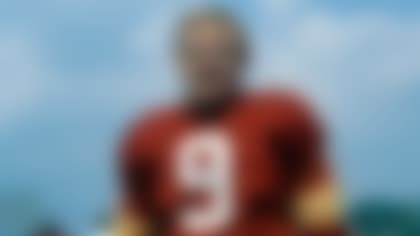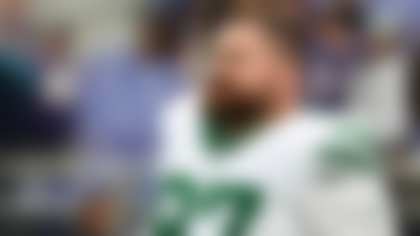SANTA CLARA, Calif. -- This is what an offensive implosion sounds like.
Panthers offensive coordinator Mike Shula sat down at an interview podium a little before 11 p.m. and began a guarded assessment of the evening, a 24-10 loss to the Denver Broncos in Super Bowl 50. On the other side of a massive curtain in front of him that divided the Broncos' and Panthers' postgame sessions, an announcer notified reporters that Broncos defensive coordinator Wade Phillips was about to be seated at Podium 10.
In the middle of an answer -- Shula was talking about Denver's relentless pass rush and why the Panthers couldn't add enough eligible blockers to make a difference -- the crowd began whooping for the man of the hour just behind the curtain. Phillips, the mastermind behind the greatest defense that John Elway has ever seen -- an actual quote by the Broncos' general manager on Sunday -- was about to hold court.
"YES!" "YEAH! WOOOOOO!!!"
Shula managed to shove out the rest of his thoughts on seven-man protections, but the night was just beginning. This was going to sting like hell, especially for a team that had helped revolutionize the way we view offense in 2015 and 2016.
So what went wrong? How do we count the ways?
"This can't turn into the 'What happened to Cam Newton show,'" Panthers tight end Greg Olsen said Sunday night.
If that's the case, we'll start with Olsen.
Taking away Newton's favorite targets
Olsen was targeted 124 times by Newton this season, with the next-closest option being Ted Ginn at 97. A pure, dual-threat tight end is so difficult to stop, and the Panthers managed to use him in many of the same ways New England used Rob Gronkowski. Before the season began, he inked an extension that will take him into his mid-30s.
But the Broncos decided to take away Newton's favorite receiving threat and gamble on the fact that Ginn and Jerricho Cotchery would not beat them in open space. Ginn, who had a 45-yard catch, came close once. Cotchery did too, but his would-be longest catch of the night was ruled a drop after a controversial challenge.
Olsen finished with four catches for 41 yards.
"Yeah, you could tell they had a plan, they had a plan," Olsen said. "They executed it well. There was a lot of bodies out there, a lot of bodies on the line trying to get off the ball and at the second and third levels. But that's expected."
Expected, maybe. But it also involved Broncos corner Aqib Talib, one of their most physical and ruthless defenders. Talib was floating around Olsen unless Olsen was trapped between a linebacker and safety - a classic Gronkowski coverage.
"We gotta keep things in perspective here," Olsen said. "What happened was a collective let down."
That's why we head to the offensive line, next.
An unstoppable Wade Phillips
"The emphasis was to play the type of defense we've been playing all year long," Super Bowl MVP Von Miller said. "Let Demarcus (Ware) rush, let Malik (Jackson) rush, (Derek) Wolfe, let all those guys be great. Of course we spied one or two or three times max, but for the most part, we just played our game."
Miller added: "Coach Phillips did an amazing job. He always likes to say that mistakes are on him, but the Super Bowl is on him, too. I really appreciate everything he's done for the whole team, not just the defense."
The Broncos were vicious at the point of attack, especially when Newton attempted to gain rhythm by using zone-read or run-option plays. A few Panthers hinted that Newton may have been forced into the wrong reads several times. But spying aside, the Broncos were beautifully fundamental against the collegiate option looks. On nearly every down, save for a dive-option flip to running back Fozzy Whitaker, the ball carrier and quarterback were covered.
This meant second and third-and-long situations. A coordinator's dream.
The Broncos logged 6.5 sacks, beating up on Newton like he hadn't been all season. They went for the ball when the opportunity arose instead of worrying about the yeoman's task of bringing Newton to the ground. They relished in the slew of one-on-one opportunities that Ware and Miller received against Carolina's offensive tackles. With more third-and-long situations, the need arose to have more eligible receivers - like Olsen - spread out.
"Well I think we did (have help) at times, but at other times, we didn't," Panthers head coach Ron Rivera said. "It's the obvious part. You can't give it to him all the time. Sometimes you've got to make plays. Again, you have to give credit to what they did and credit to how the young man played. I'm not going to take anything away from Von Miller or any of his teammates."
"I think obviously the defense gave us a lot of opportunities and we did some good things, but at the end of the day we didn't do a good enough job keeping him clean, protecting him," Panthers center Ryan Kalil said. "Especially toward the end of the game."
Newton, himself
The Panthers are a close-knit team, and that means many players and coaches trying to protect Newton. Newton did not do much in the way of helping his case during his post-game interview, but we address that situation over here. There are plenty of layers to consider.
This is not an indictment of Newton, but more of a common feeling we all experience from time to time. By the three-minute mark of the fourth quarter, when the Panthers trailed by two scores, Newton appeared all but finished. There were times this season when his confidence was terrifying - meme worthy. But as he jogged in the first play call, the incomplete pass before the DeMarcus Ware sack, there was nothing on display. Not from Newton, and not from anyone in the Carolina huddle.
"When you really look at it more than anything else, the problem is we turned the ball over," Ron Rivera said. "I mean we fumbled the ball when we really haven't fumbled the ball. A couple of tipped passes that get intercepted. You're not going to win football games when you make mistakes like that. Again, credit to them. They did some really great things. They really did. On the offensive side of the ball, they were very efficient when they needed to be and kicked field goals and at the very end they were able to score the last touchdown."
According to Shula, the Broncos did not mix up their coverages much. Like the Seattle defense before them, they were quite brazen in letting the game come to them.
Newton finished the game 18-of-41 for 265 yards and an interception. Similar to Manning in his Super Bowl loss to Seattle, a few failures ended up snowballing. Ginn tipped a pass in the red zone that ended up getting intercepted, and he wasn't the only player with high-profile drops.
In Manning's Super Bowl loss, Seattle's defense was almost impossible to overcome. Newton learned Sunday what that looked like.











